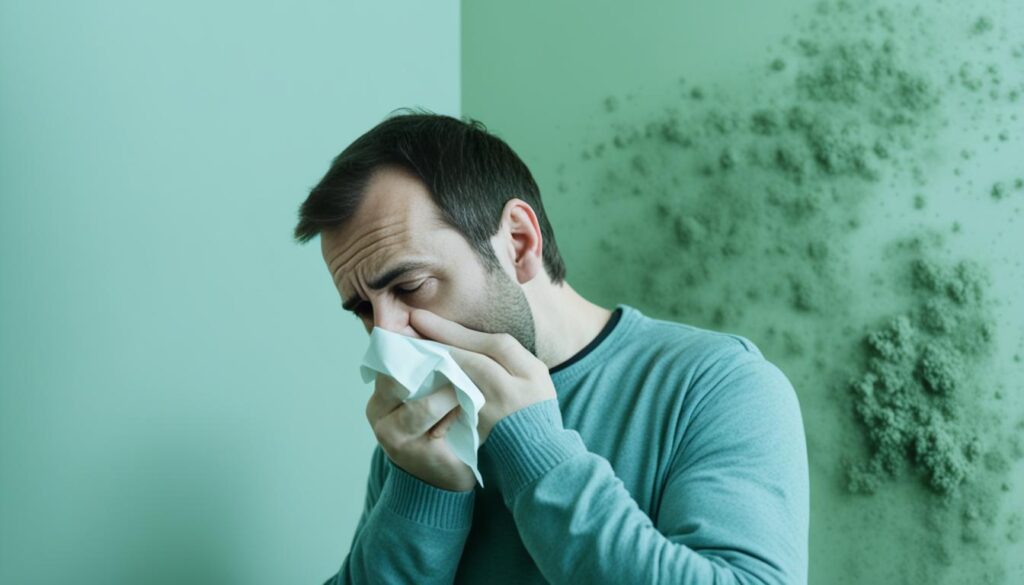
Miami Mold Exposure Symptoms in Adults – Know the Signs
Living in Miami comes with its own set of challenges, one of which is mold exposure. Mold can be found in various environments, including homes, offices, and public spaces, and it can have serious health implications, especially for adults. It’s essential to be aware of the symptoms of mold exposure, so you can take prompt action to protect yourself and your loved ones.
Key Takeaways:
- To protect your health, it’s important to be familiar with the symptoms of mold exposure in adults.
- Common symptoms include respiratory issues, skin irritations, and allergic reactions.
- Cognitive and neurological symptoms such as memory problems and mood changes can also occur.
- Other possible symptoms may affect different bodily systems, including digestion and immune function.
- If you suspect mold exposure, it’s crucial to consult a professional, such as Fix Mold Miami, for a thorough assessment.
Common Symptoms of Mold Exposure in Adults
When it comes to mold exposure, adults may experience a variety of symptoms that can impact their overall health and wellbeing. Recognizing these common symptoms is essential in seeking appropriate medical attention and addressing any potential mold issues in your surroundings.
Respiratory Symptoms
One of the most prominent signs of mold exposure in adults is respiratory problems. Individuals may experience coughing, wheezing, shortness of breath, and chest tightness. These symptoms can be particularly noticeable in individuals with pre-existing respiratory conditions such as asthma or allergies.
Allergic Reactions
Mold exposure can trigger allergic reactions in susceptible individuals. These reactions may manifest as nasal congestion, sneezing, runny nose, itchy eyes, and throat irritation. In some cases, individuals may develop a skin rash or hives upon exposure to mold.
Headaches and Fatigue
Headaches and fatigue are other common symptoms associated with mold exposure in adults. Persistent headaches that do not have an identifiable cause and inexplicable fatigue or lethargy can be indicative of mold-related issues. These symptoms may persist even after getting enough rest or taking pain relievers.
Gastrointestinal Issues
Mold exposure can also affect the digestive system, leading to gastrointestinal problems such as nausea, diarrhea, and abdominal pain. These symptoms may be recurrent and can significantly affect an individual’s quality of life.
Neurological Effects
Beyond physical symptoms, mold exposure can also impact cognitive function and neurological health. Adults may experience memory problems, difficulty concentrating, mood swings, and changes in behavior. These symptoms can disrupt daily activities and impair overall cognitive function.
Common Symptoms of Mold Exposure in Adults
| Respiratory Symptoms | Allergic Reactions | Headaches and Fatigue | Gastrointestinal Issues | Neurological Effects |
|---|---|---|---|---|
| Coughing | Nasal congestion | Headaches | Nausea | Memory problems |
| Wheezing | Sneezing | Fatigue | Diarrhea | Difficulty concentrating |
| Shortness of breath | Runny nose | Abdominal pain | Mood swings | |
| Chest tightness | Itchy eyes | Changes in behavior | ||
| Throat irritation |
Take Action
If you are experiencing any of these common symptoms of mold exposure, it is crucial to consult a healthcare professional. Additionally, it is important to address the underlying mold issue in your environment by contacting a professional mold remediation service, such as Fix Mold Miami at 305-465-6653. Don’t ignore these symptoms, as timely intervention can protect your health and prevent further complications.

Physical Symptoms
When adults are exposed to mold in Miami, it can lead to a range of physical symptoms. These symptoms can vary from person to person and may depend on factors such as the type and amount of mold present, the duration of exposure, and individual susceptibility. It is important to be aware of these physical symptoms in order to take appropriate action and seek medical attention if necessary.
Some common physical symptoms of mold exposure in adults include:
- Respiratory problems such as coughing, wheezing, and shortness of breath
- Skin irritations like rashes, itching, and hives
- Allergic reactions, including watery eyes, sneezing, and nasal congestion
- Headaches and migraines
- Fatigue and weakness
- Sore throat and hoarseness
- Nausea and digestive issues
Mold exposure can also exacerbate existing respiratory conditions such as asthma or allergies, leading to more severe symptoms.
It’s important to note that these physical symptoms may not appear immediately after exposure to mold. They can develop over time or appear suddenly, depending on the individual’s sensitivity and the extent of mold contamination.
Remember, if you experience any of these physical symptoms and suspect mold exposure, it’s crucial to consult a healthcare professional for an accurate diagnosis and appropriate treatment.

| Physical Symptoms | Prevalence |
|---|---|
| Respiratory problems | High |
| Skin irritations | Moderate |
| Allergic reactions | High |
| Headaches and migraines | Moderate |
| Fatigue and weakness | Moderate |
| Sore throat and hoarseness | Low |
| Nausea and digestive issues | Low |
Cognitive and Neurological Symptoms
Exposure to mold can have various effects on the cognitive and neurological health of adults in Miami. It is important to be aware of these symptoms in order to seek appropriate medical attention and address any underlying mold issues. Here are some common cognitive and neurological symptoms associated with mold exposure:
Memory Problems
Individuals exposed to mold may experience difficulties with memory, including forgetfulness and trouble retaining new information. These cognitive impairments can significantly impact daily life and productivity.
Difficulty Concentrating
Mold exposure can disrupt an individual’s ability to concentrate and focus. Adults may find it challenging to maintain attention, follow conversations, or complete tasks that require sustained mental effort.
Changes in Mood or Behavior
Mold exposure has been linked to changes in mood and behavior in some individuals. It can lead to feelings of irritability, anxiety, depression, or even unexplained personality changes. It is crucial to recognize these shifts and seek appropriate support.
If you’re experiencing any of these cognitive or neurological symptoms after mold exposure, it is essential to consult a medical professional for a comprehensive evaluation. They will be able to provide an accurate diagnosis, recommend appropriate treatment, and help you take the necessary steps to mitigate your exposure to mold.
Other Possible Symptoms
While respiratory issues, skin irritations, and cognitive symptoms are commonly associated with mold exposure in adults, there are other potential symptoms that individuals might experience. These symptoms can affect various systems in the body, leading to discomfort and a decline in overall well-being.
Gastrointestinal Disturbances
One of the possible symptoms of mold exposure in adults is gastrointestinal disturbances. This can manifest as stomach cramps, diarrhea, nausea, or vomiting. These symptoms may be a result of ingesting or inhaling mold spores or toxins present in contaminated environments.
Immune System Reactions
Mold exposure has been linked to immune system reactions in some adults. This can lead to an increase in allergies, hypersensitivity, and autoimmune disorders. Individuals with compromised immune systems may be particularly vulnerable to these reactions.
General Fatigue and Malaise
Adults who have been exposed to mold may frequently experience fatigue, weakness, and an overall sense of malaise. This persistent lack of energy can significantly impact daily activities and quality of life.
Other Symptoms of Mold Exposure in Adults
| Symptom | Description |
|---|---|
| Headaches | Recurring headaches that are not associated with any other underlying condition. |
| Joint and Muscle Pain | Unexplained pain, stiffness, or discomfort in the joints and muscles. |
| Vision Problems | Blurry vision, eye redness, watery eyes, or sensitivity to light. |
| Disrupted Sleep | Difficulty falling asleep, staying asleep, or experiencing poor sleep quality. |
| Reproductive Issues | Menstrual irregularities, fertility problems, or hormone imbalances. |
It is important to note that these symptoms may vary in severity and duration depending on the individual’s sensitivity, duration of exposure, and overall health. If you or someone you know is experiencing any of these symptoms and suspect mold exposure, it is advisable to seek medical attention and consider professional mold assessment and remediation services.
Conclusion
In conclusion, being aware of the symptoms of mold exposure is crucial for adults living in Miami. By recognizing these signs, individuals can take proactive steps to protect their health and well-being. Mold exposure can lead to a range of physical and cognitive symptoms, which may vary from person to person.
If you suspect mold exposure or experience any of the common symptoms discussed in this article, it is recommended to seek professional assistance. Fix Mold Miami, at 305-465-6653, offers mold assessments and can help you identify and address any potential mold issues in your environment. Prompt action is essential in preventing further health complications.
Remember, mold can thrive in various areas, including homes, workplaces, and public spaces. Regularly inspecting your surroundings and taking necessary precautions, such as maintaining proper ventilation and moisture control, can help minimize the risk of mold exposure. Stay vigilant and prioritize your health by being proactive in preventing and addressing mold-related issues.




